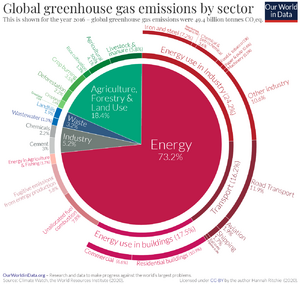Electric vehicles

Problem: Most vehicles today run on gasoline, diesel, or other fossil fuels that cause climate change. About 16% of the world's GHG emissions are due to vehicles.
Possible solution: Make vehicles electric. But this comes with some serious challenges that must be dealt with first, before electric vehicles (EVs) can be mass-produced enough to actually make a difference for the planet.
Status quo
- Only about 1% of vehicles on the road today are electric.
Types of EVs
By type of energy storage:
- Battery electric vehicles (most common EVs today)
- Fuel cell vehicles (very few models on the market today)
By type of vehicle:
- Passenger
- Electric cars, vans and pickup trucks
- Electric buses (city and intercity)
- Electric planes (not in use, except experimentally)
- Freight
- Electric trucks (semi trucks / freight trucks)
Considerations
Battery minerals
The batteries in today's EVs contain large amounts of metals that are too scarce. This makes EVs expensive and unscalable.
More specifically:
- Almost all of today's EVs use lithium-ion batteries that are made of nickel, cobalt, manganese and of course lithium.
- Cobalt is the biggest issue: it's scarce, and its production involves child labor.
- Hydrogen fuel cell vehicles are based in platinum-group metals (PGMs), which are also scarce.
With either of these technologies, if we want to make all cars electric, there simply aren't enough minerals available to be mined from the Earth. We need to use some other type of energy storage instead. This involves tradeoffs.
Possible solutions
- Sodium-ion batteries
- not available on the market yet
- could potentially be built with only abundant materials
- LFP batteries
- available on the market
- cobalt-free, but still based in lithium
- in other words, more scalable but still not as scalable as we'd like.
The main problem with these types of batteries is that they hold less of a charge - in other words, the vehicle would have less range. But at least it would be more affordable.[QUANTIFICATION needed] In the case of electric cars, this compromise might actually be fine if the average buyer is okay with it.
Every once and awhile there's some news article about some company researching / developing / investing in some battery type that will supposedly be as energy-dense as lithium-ion. But there's no guarantee it'll happen in the near future, and if it does, it'll probably be expensive.
Generating enough electricity
- Whenever the electricity comes from fossil fuels, electric cars are barely any better than gasoline cars when it comes to carbon emissions.
- The majority of the world's electricity does in fact come from fossil fuels. Other energy sources have a hard time scaling up.
- For electric vehicles to save the environment, we're going to need a lot more solar, wind, or alternative types of nuclear. Any of these require overcoming some major challenges.
Availability of charging
This section has not been filled in yet.
Rare-earth magnets
Efficient electric motors need strong magnets, which can only be made with certain minerals known as rare-earth elements (REEs)
This is true even if all energy were to come from wind turbines, which also contain rare-earth magnets.
TODO: Add the calculations & research that led to this statement.